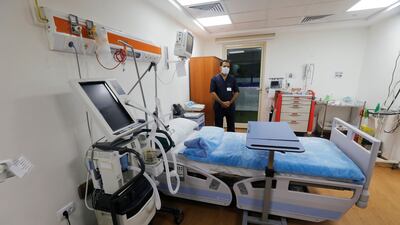Egypt’s health ministry said earlier this week that it is studying a new mechanism through which citizens can posthumously donate their organs to those in need.
Following a meeting with President Abdel Fattah El Sisi earlier this week, his advisor on health Mohamed Tag El Din issued a statement confirming that the government was looking into introducing an organ donation option on Egyptian national ID cards, as is the practice in many countries around the world.
The country’s health minister Khaled Abdel Ghaffar told Kelma Akheera, a popular talk show, that Egypt is lagging behind most Arab countries that have introduced organ donation systems successfully.
He singled out the UAE, Bahrain, Saudi Arabia and Morocco as examples of countries that have functioning organ donation systems.
Although Egypt legalised posthumous organ donations in 2010 at which time a health ministry committee was formed to manage them, political instability in the ensuing years was a major hindrance to the committee’s plans to make it a more common practice, according to a televised statement by committee member Dr Inas Abdel Halim last week.
Ms Abdel Halim said there are cultural and psychological barriers in many Egyptians’ minds that make them see organ donations after death as a violation of the sanctity of the deceased.
Furthermore, posthumous organ donations were in the past rejected by some of Egypt’s religious figures such as renowned Islamic scholar Sheikh Muhammad Metwalli Al Sha'rawi who denounced them in a famous television interview on the grounds that the body does not belong to the human, but to God, and that the human has no right to donate or alter something that he does not own.
However, in 2010, Al Azhar, Egypt’s highest authority on Sunni Islam, and the Coptic church both came out in support of the donations, calling them a virtue of the highest order.
The issue was pushed into the limelight earlier this week after renowned Egyptian actress Elham Shahin went public in an Instagram live post with her intention to donate all her healthy organs to those in need after her death.
Shahin in her video said that Egyptians need to overcome their issue with organ donations.
“Our bodies will disintegrate either way, we will be eaten by worms. So why not save someone from an unhappy life by donating our organs? It is a virtue that Egyptians need to understand. We need to introduce this culture in Egypt because it is truly more human,” Shahin said in her video.
Following the live video, Egyptian social media channels erupted with commentary from supporters of posthumous donations on one hand, and denouncers on the other.
Mr El Sha'rawi’s interview was widely shared on social media by denouncers of the new mechanism over the past week.
A number of televised interviews with several Egyptian health officials addressed the issue over the past week, culminating in a statement from the country’s health ministry on Monday, announcing a renewed commitment to changing some of the cultural and psychological barriers that they say are the main reason that organ donations aren’t more common in Egypt.
“Thus far, Egyptian organ transplants were mostly done using organs taken from live donors, what we are trying to do now is change that because for example using a deceased person’s whole liver is a much more successful transplant than using a piece of a living person’s liver which takes time to grow inside the recipient,” Mr Abdel Ghaffar said.
He further explained that there is an ongoing collaboration with the ministries of justice and interior to introduce a legal document that donors can sign to ensure their organs are given over to Egyptian health institutions after their death.
However, in his statement Mr Tag El Din said the government has no plans to force anyone into donating their organs or their loved ones' organs should they change their mind at any point.
He explained that the government is going to be implementing a more lenient strategy focused on raising awareness and getting a larger portion of the populace to be on board with the donations.
Mr Tag El Din’s sentiments were reiterated by Mr Abdel Ghaffar, who told talk show host Lamees El Hadidy that the media has an important role in raising awareness around the virtues of donating one’s organs.
President El Sisi directed on Monday the expanding of the country’s organ transplantation facilities, which have thus far been mainly focused on liver and kidney transplants.
Mr El Sisi announced the expansion of the Nasser Institute to make it the largest medical facility in the Middle East. He said a particular focus was going to be placed on organ transplantation.
Mr Abdel Ghaffar said the country intends to expand into transplanting lungs also, revealing that a team of medical professionals from Ain Shams University recently returned from rigorous training abroad to learn the latest lung transplantation operations.
The health minister said that Egypt intends to invest 65 billion Egyptian pounds (about $3.3 bn) from the national budget into various medical developments in the coming year.
Abdel Ghaffar also said that the state intends to collaborate intensively with the private sector in the future to improve medical facilities in Egypt.


